Skyrim is one of the biggest names of this console generation. It's already earned the status of "classic" in some circles. It's over three years old now, and I've been playing it (and its DLC) on my PS3 off and on for much of that time. I've been wanting to write a review, but I just never felt that I had progressed far enough into the game to have a full idea of its overall quality. Considering how long the game's been out, and how successful it's been both critically and commercially, this is more of a retrospective than a true review, since I'm not going to influence anybody's purchase decision. All I can do at this point is talk about what I think he game did right, and what it did wrong, so that future games can hopefully improve on the formula.
After years of playing, I've finally made enough progress with various characters to feel comfortable writing a review. With the recent rumors that Fallout 4 may reuse Skyrim's engine, I feel that this review actually has some relevance still.
The game also includes DLC, which I have reviewed separately in a another post.
The engine finally works! … Mostly …
It seems like Bethesda’s open-world game engine is finally maturing. It’s still a little rough around the edges and has its fair share of bugs and glitches (particularly pertaining to companion characters and home customization), but I was amazed when I realized that, for the first time with a Bethesda RPG, I had been playing the game for weeks without needing to consult the online wiki to find a work-around for a glitch that rendered any characters missing, quests inaccessible, or items missing! With Oblivion and the two Fallout games, it didn’t take more than a few hours of gameplay to start running into such glitches.
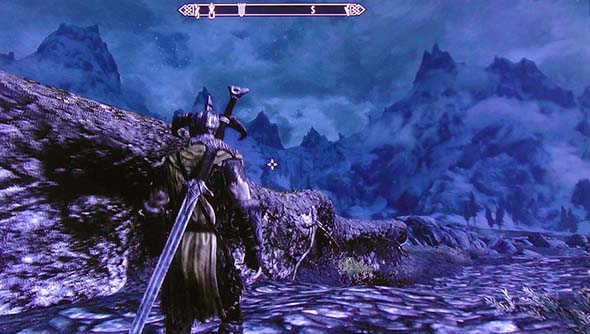
The large, open world is finally stable enough to be more fun than frustrating.
My roommate actually had a game-breaking glitch that prevented him from saving after the initial character creation (including auto-saves), so he lost a whole Saturday afternoon’s worth of progress and had to restart the game. That one was a doozy, and admittedly the worst bug that I've experienced so far in any Bethesda game! But these problems have been the exception rather than the norm.
So that’s one big check mark in Skyrim’s favor compared to previous Bethesda games!
Removing level-scaling makes leveling a reward rather than a punishment
Believe it or not, it wasn't the frequency of glitches that deterred me from finishing Oblivion; it was the level-scaling system. On paper it seemed like a good idea. Leveling up the enemies, quests, and loot so that the game is consistently challenging and rewards are consistently worthwhile sure sounded like a good idea!
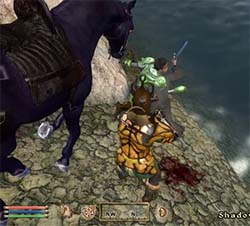
Oblivion's level-scaling resulted in a world overrun by trolls, glass-armored bandits, and Daedra.
But in practice, it turned out to be completely ruinous. Leveling felt more like a punishment than a reward, as everything in the world also became progressively harder. This issue was compounded by the poor balance between different classes. If you weren't leveling your combat skills, and had created a class built around - say - Mercantile, Athletics, and Acrobatics then you could easily over-level early in the game simply by walking around and talking to NPCs, only to get slaughtered in the first Oblivion gate because the enemies were stronger than you and you couldn't talk your way out of the fight.
Skyrim fortunately, does not retain Oblivion's strict level-scaling feature.
Some quests, enemies, and loot are scaled, but most things are not (or they're only slightly scaled). Now, bandits are always just bandits, overpowering enemies start the game overpowered, and the world does not suddenly become exclusively populated by trolls and Daedra halfway through the game. "Dungeon bosses" do seem to scale with the character’s level. As you start going up in levels, you’ll start to notice that the grunts in the dungeons are trivial to fight and leave worthless loot. You’ll actually feel like all that leveling has paid off! Then you get to the "boss" at the end of the dungeon and might get your ass handed to you and have to reload several times.
Hard areas should be hard, and easy areas should be easy. It's just mildly annoying that this game gives you no indication which it’s going to be until you’re already a mile underground, and the difficulty varies wildly - even within a single dungeon crawl.
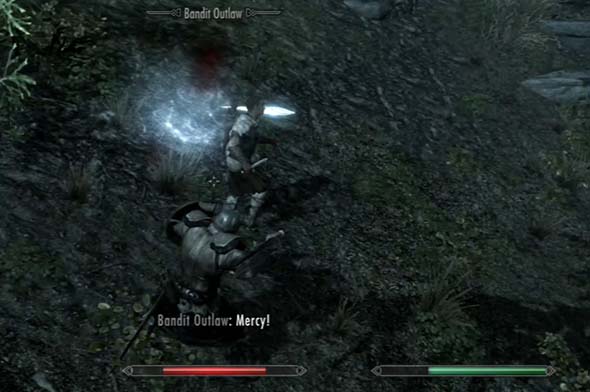
Most ambient encounters aren't scaled to the player's level, so bandits always remain just bandits.
Removing the class skills frees up the player to develop whatever skills he or she needs without the compulsion to micro-manage leveling class skills versus non-class skills. Character development feels much more natural and organic, and you can change your specialization at any time if circumstances change ... [More]
452deb1e-0838-4ffe-a6da-528d57ba6804|3|2.0
Tags:The Elder Scrolls, The Elder Scrolls V: Skyrim, Skyrim, Bethesda, RPG, action, fantasy, open world, dragon, dragonborn, magic, user interface, NPC, AI
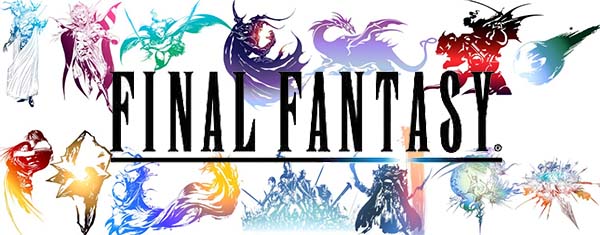
Despite being great games, the character development systems of many Final Fantasy games have really weird qualities that put them at odds with the games' narratives. One of the things that separates games from other media such as books or movies is that games are interactive experiences. The best games typically have gameplay that informs story and / or a story that informs the gameplay. This is especially true of RPGs, which are generally designed entirely around their stories and characters.
While the combat and character development systems of most Final Fantasy games do have a basis in the game's narrative, some of the Final Fantasy games have gameplay systems that actually pull the player out of the story and create strong disconnects between the gameplay and the narrative.
Yet, we still love these games. That is either a testament to the overall quality of the games, or to the general gullibility of gamers.
Perhaps the two most popular Final Fantasy games are the worst offenders in terms of having gameplay mechanics that aren't well integrated into the narrative.
Final Fantasy VII is widely regarded as best game of the series, and it frequently appears on lists of "the Best Games Ever". Its story, characters, and locations have become iconic. And its primary character-development mechanic, materia, is generally well-received by fans and critics. The materia itself is even a functional object in the game world and an integral part of the plot, instead of just an abstract game mechanic.
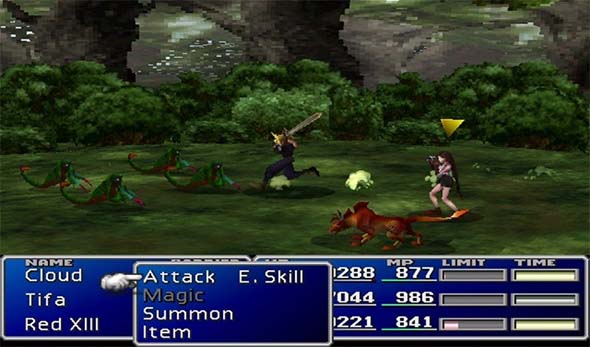
All skills and abilities (except Limit Breaks) are granted by equipping materia,
making all character functionally almost identical.
However, this materia system does have one significant drawback: It severely limits the role of the characters in the actual gameplay.
From a gameplay perspective, the characters of Final Fantasy VII are mostly blank slates. The only mechanics that are unique to characters is their weapon classes and unique limit breaks. The weapons are mostly cosmetic, since the combat mechanics don't differentiate them much. There are slight variations in the number and arrangement of materia slots between characters' weapons, but these are minor differences. Limit breaks are infrequently used and are of little consequence ... [More]
ea7aa59c-7493-4967-ac9b-2c6f6f385c7c|1|5.0
Tags:Final Fantasy, Final Fantasy VII, Final Fantasy VIII, Final Fantasy IX, Final Fantasy X, Final Fantasy X-2, Final Fantasy XII, Final Fantasy XIII, Final Fantasy XV, materia, guardian force, sphere grid, dress sphere, job, level up, RPG, story, Squaresoft, Square-Enix
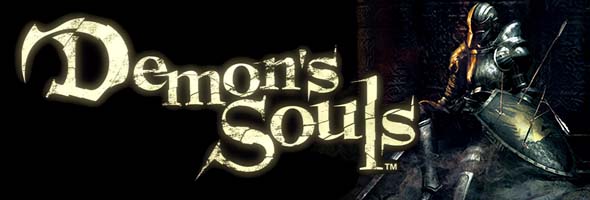
With a new generation of consoles coming into their own, the lifespan of the PS3 and XBox360 is rapidly coming to an end. It's not quite as monumental as the end of the PS2's lifecycle, which is arguably the single best gaming console ever made! With the PS3 and XBox360, our console games started to have consistent online functionality, and with online functionality comes a sad side-effect: a game's life-span is finite. I can always go back and play my favorite PS2 games (like Silent Hill 2, Metal Gear Solid 3, Ace Combat 4, Ico, Shadow of the Colossus, Gran Turismo 3, and Devil May Cry) and have pretty much the same experience that I had the first time I played. But I won't be able to do that with some of my favorite PS3 games, because some of them have online features that won't remain active forever.
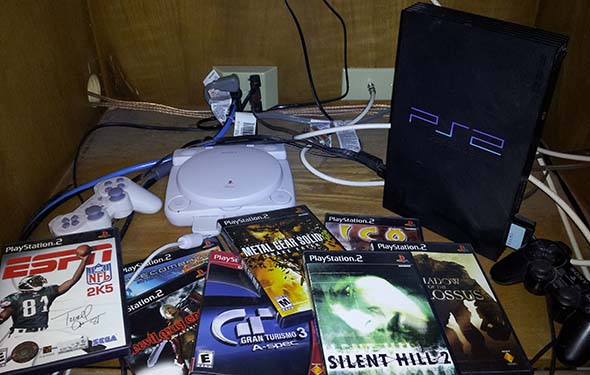
As long as my PS2 is functional, I can always go back and re-play my favorite PS2 games.
PC gamers have been dealing with this problem since the dawn of the internet, but they have work-arounds. PC Games can be modded to support direct TCP / IP connections in order for their online communities to stay online. Hypothetically, you could keep your favorite MMO alive for yourself and your circle of friends in this fashion. But with console games, there are much more significant technical hurdles to overcome, and when the producer shuts down the servers, that is basically the end of that game.
And that is exactly what is going to happen some day with my favorite PS3-exclusive: Demon's Souls.
Every console has its defining games - those games that are reasons for owning the consoles. The original PlayStation had Final Fantasy VII and Metal Gear Solid, the Nintendo 64 had Goldeneye, the Dreamcast had Shenmue and Soul Calibur, the XBox had Halo, GameCube had Resident Evil 4 and Eternal Darkness, the PS2 had Shadow of the Colossus. For me, Demon's Souls is that game for the PS3: the game that makes owning a PS3 worthwhile.
Demon's Souls is a game that completely redefined the way that I think about gaming. My ideas about how a player can interact with a game world and with other players were completely turned on their head with this game. So I want to take a moment to pay tribute to this masterpiece of interactive art with a full review while its servers are still up and running. And maybe - just maybe - I can sell a copy or two to some new players.
Deep and addictive hack 'n' slash action
The gameplay is based on a simple control configuration in which weapons are mapped to the left and right hand and controlled with the left and right shoulder buttons (respectively). The design is reminiscent of a simplified version of FROM's other major game franchise: the mech-combat sim Armored Core. Weapons equipped in the right hand have a basic attack and a heavy attack, and weapons or shields in the left hand have a block and heavy attack (sorry, lefties, no left-handed characters for you!). These basic controls are very simple, and any player can start hacking and blocking away as soon as they pick up the controller. But more advanced controls and variations in weapon functionality make this seemingly-simple combat system very deep.
Each weapon class has different movesets, ranging from the slashing of a sword to the thrusting of a spear, to smashing of a giant hammer. And shields (and some off-hand weapons) have an advanced parry feature that allows you to stun and counter an attacking foe to land a critical hit. You can also attack while running or out of dodges in order to keep a foe guessing. Mastering these various features takes a little bit of time, but it is immensely rewarding when you finally have the skills to go toe to toe with a giant, butcher-knife wielding skeleton with confidence. But don't get overconfident, because this game will punish you for every mistake!
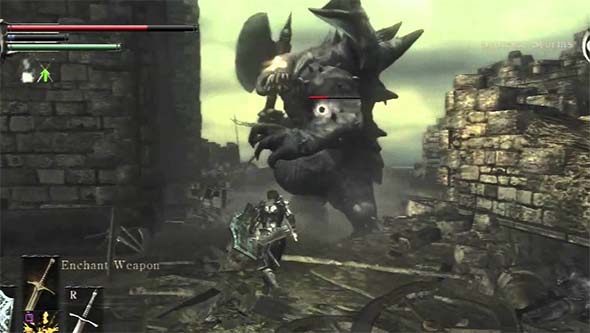
With patience and practice, you'll soon stand confidently before the Vanguard that killed you in the tutorial.
If you die, you lose all your accumulated souls (i.e. "experience"), and must restart the level from the beginning! But there is a shining glimmer of hope: you have one chance to reach the spot where you died in order to recover your lost souls. If you get there... [More]
2d2c2b68-3795-49ce-9bcb-9c3537a79e64|5|4.2
Tags:Demon's Souls, From Software, Atlus, Sony, PlayStation, PS3, PSN, exclusive, RPG, adventure, hack and slash, survival horror, online, PvP, co-op, summon, multiplayer, invader, invasion, phantom, hardcore, mindflayer, Boletaria, Stonefang Tunnel, Tower of Latria, Shrine of Storms, Valley of Defilement, Hidetaka Miyazaki, retro review
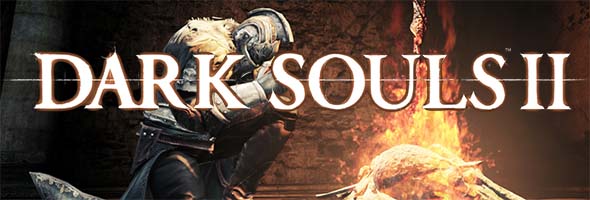
Despite being very excited about this game and pre-ordering the collector's edition (contrary to my typical avoidance of pre-orders), it took a couple months before I was able to spend much time with it. My strategy guides for Civilization V: Brave New World was a lot of work and took up a lot of time. I was only able to play bits and pieces of Dark Souls II during that time and didn't make much progress. I was hoping to have a review out in time for the PC release, but that didn't happen. Then I was hoping to publish the review before the first DLC hit, but that didn't happen either. I'll probably review the DLC later, once all three have been released.
Full disclosure: I haven't actually finished the game yet, but I do feel that I've played enough of it to be able to write a review. If completing the game changes my opinion considerably, then I will revise this review as I've done with other games in the past (including the first Dark Souls). I've also considered getting the Steam version, since it may be better than the console versions. If I do play that version, I may revise this review to include opinions on that version.
But for now, I've only played the PS3 version,
Table of Contents
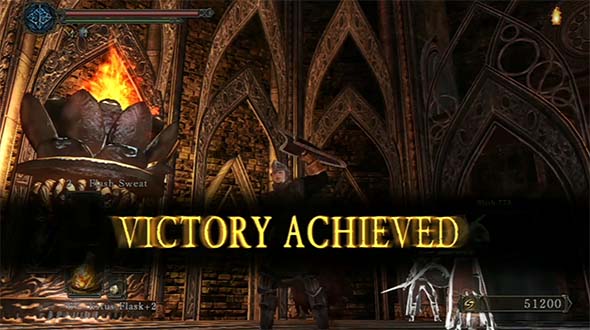
Is Dark Souls II a victorious successor to a masterpiece of design and storytelling? [More]
1e979d23-e202-4346-8a43-c52fdd6c81c1|3|3.7
Tags:Dark Souls II, PS3, Dark Souls, From Software, Namco/Bandai, RPG, PSN, hack and slash, fantasy, Demon's Souls, PC, review, pre-order, XBox 360, Xbox Live, co-op, summon, PvP, invader, invasion, phantom, covenant, Drangleic, Majula
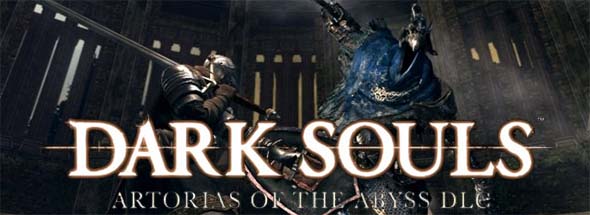
I may have been a bit hard on Dark Souls in my original review (despite spending like six months playing it before I reviewed it). I guess - despite my best efforts - I just couldn't get over my love for Demon's Souls (which I still think was a better game for its time). But Dark Souls ended up eating up a lot of my time, and I have fallen as much in love with it as I had for Demon's Souls. As such, I have updated my original review with a new, retrospective score to go along with this DLC review. I bought and downloaded Artorias of the Abyss DLC on day one (PSN) when it was released last year, but didn't get around to playing it until earlier this year.
Instead of just unlocking a special quest as soon as the DLC is download (ala Skyrim), the DLC of Dark Souls can only be accessed by defeating an existing, but entirely optional boss in an existing, but entirely optional area of the world; then defeating an existing enemy that allows access to a specific NPC; then defeating another monster in one of the end-game areas (after acquiring the Lordvessel) in order to unlock the "key" to the DLC content. Phew. That's a lot of hoops to jump through! So it took me a while just to be able to access the new content - let alone play through it. Sure, you may have paid for this DLC, but FROMSOFTWARE is still gonna make you work for it; and kudos to them for not compromising on their principles! [More]
|

| 12 | | | | | | | 60 | | 11 | | | | | | | 55 | | 10 | | | | | | | 50 | | 09 | | | | | | | 45 | | 08 | | | | | | | 40 | | 07 | | | | | | | 35 | | 06 | | | | | | | 30 | | 05 | | | | | | | 25 | | 04 | | | | | | | 20 | | 03 | | | | | | | 15 | | 02 | | | | | | | 10 | | 01 | | | | | | | 05 |
|